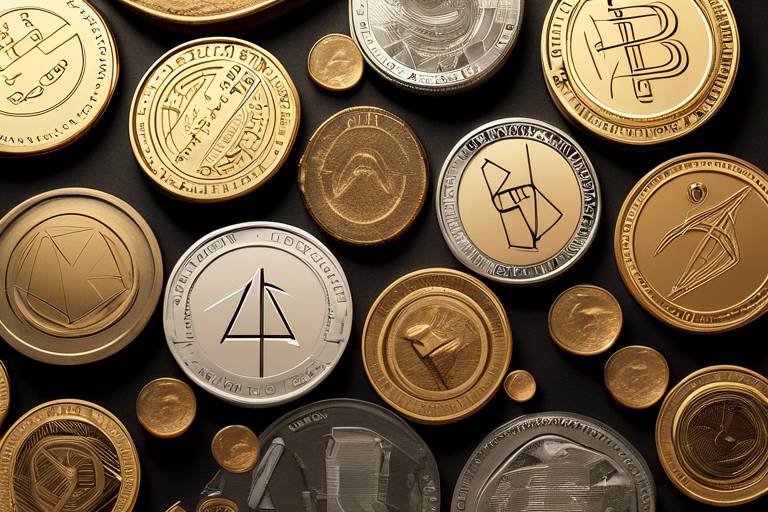The Future of Decentralized Exchange (DEX) Technologies
The world of cryptocurrency is evolving at a breakneck pace, and at the forefront of this revolution are Decentralized Exchanges (DEX). Unlike traditional exchanges that rely on intermediaries, DEX platforms operate on a peer-to-peer basis, allowing users to trade directly with one another. This shift is not just a trend; it's a fundamental change in how we think about trading digital assets. Imagine a marketplace where you can buy and sell without the need for a middleman, where your funds are always under your control. Sounds appealing, right?
As we delve deeper into the future of DEX technologies, we find that they are poised to offer a plethora of benefits. Enhanced security, user autonomy, and the potential for financial inclusivity are just a few of the advantages that make DEX platforms attractive. However, it's not all sunshine and rainbows; challenges such as regulatory hurdles and liquidity issues are significant roadblocks that need addressing. In this article, we will explore the evolving landscape of DEX, examining both the opportunities and the challenges they present.
So, what does the future hold for decentralized exchanges? With advancements in technology and a growing acceptance of cryptocurrencies, DEX platforms are likely to become more sophisticated and user-friendly. The integration of features like automated market makers (AMMs) and layer-2 solutions are just the beginning. These innovations aim to enhance trading efficiency and reduce transaction costs, making DEX platforms more appealing to a broader audience.
Moreover, the regulatory landscape is also evolving. Governments and regulatory bodies are beginning to recognize the significance of DEX technologies, which could lead to more structured guidelines that promote both innovation and user protection. The balance between regulation and freedom is delicate, but it's essential for the long-term sustainability of decentralized finance.
As we look ahead, we can also expect to see a greater emphasis on community governance within DEX platforms. Decentralized Autonomous Organizations (DAOs) are emerging as a way for token holders to participate in the decision-making process, ensuring that the platform evolves in a way that reflects the interests of its users. This shift towards community-driven governance is not just a trend; it's a fundamental aspect of what makes DEX unique.
In summary, the future of decentralized exchange technologies is bright, filled with potential and challenges alike. As more users become aware of the benefits and as technology continues to advance, DEX platforms are likely to play an increasingly vital role in the cryptocurrency ecosystem. Are you ready to dive into this exciting world?
- What is a decentralized exchange? A decentralized exchange is a trading platform that allows users to trade cryptocurrencies directly with one another without the need for an intermediary.
- What are the benefits of using a DEX? Benefits include enhanced security, greater control over funds, and increased financial inclusivity.
- What challenges do DEX platforms face? Challenges include regulatory concerns, liquidity issues, and user experience hurdles.
- How do DEXs differ from centralized exchanges? DEXs operate without a central authority, while centralized exchanges rely on intermediaries for transactions.
- What is community governance in DEX? Community governance involves token holders participating in decision-making processes through decentralized autonomous organizations (DAOs).

Understanding Decentralized Exchanges
Decentralized exchanges, often referred to as DEXs, represent a revolutionary shift in the way we think about trading cryptocurrencies. Unlike traditional exchanges that operate on a centralized model—where a single entity controls the exchange and holds users' funds—DEXs operate on a peer-to-peer basis. This means that transactions occur directly between users without the need for intermediaries. Imagine a bustling marketplace where buyers and sellers interact directly, without a middleman taking a cut; that's the essence of a decentralized exchange.
At their core, DEXs utilize blockchain technology to facilitate trades, ensuring that all transactions are transparent, secure, and immutable. This eliminates the risk of hacking that centralized exchanges face, where large amounts of user funds can be compromised. Instead, users retain control of their private keys, which is akin to holding your money in a personal wallet rather than a bank. This level of control empowers users, allowing them to trade on their terms.
Moreover, DEXs are significant in the evolving cryptocurrency ecosystem for several reasons:
- Privacy: Users can trade without revealing their identities, which is a stark contrast to centralized exchanges that often require extensive KYC (Know Your Customer) processes.
- Global Access: DEXs are accessible to anyone with an internet connection, breaking down geographical barriers that often restrict participation in traditional finance.
- Financial Sovereignty: Users are not only in control of their funds but also the trading process, reducing the risk of manipulation by centralized entities.
As we delve deeper into the mechanics of DEXs, it's essential to understand how they operate. Most DEXs use smart contracts—self-executing contracts with the terms of the agreement directly written into code. These smart contracts automate the trading process, ensuring that trades are executed only when specific conditions are met. This automation not only speeds up transactions but also reduces the chances of human error.
Furthermore, DEXs often employ various trading mechanisms, such as order books or automated market makers (AMMs). In an order book model, trades are matched based on buy and sell orders, similar to how traditional exchanges operate. On the other hand, AMMs allow users to trade against liquidity pools, which are collections of funds provided by other users. This method can lead to more efficient trading and lower slippage, making it an attractive option for many traders.
In summary, decentralized exchanges are more than just a trend; they are a fundamental shift towards a more open and equitable financial system. By removing intermediaries, DEXs offer enhanced security, privacy, and accessibility. As the cryptocurrency landscape continues to evolve, understanding the mechanics and benefits of DEXs is crucial for anyone looking to navigate this exciting new frontier.

Benefits of DEX Technologies
Decentralized exchanges (DEX) have emerged as a revolutionary force in the cryptocurrency landscape, providing users with a myriad of benefits that are reshaping how we think about trading digital assets. One of the most compelling advantages of DEX technologies is the enhanced security they offer. Unlike centralized exchanges, which are often prime targets for hackers due to their large reserves of user funds, DEX platforms allow users to trade directly from their wallets, minimizing the risk of losing assets to malicious attacks. This shift not only protects individual users but also fosters greater trust within the cryptocurrency community.
Another significant benefit of decentralized exchanges is the level of control they provide to users. In a DEX environment, individuals are in charge of their private keys and funds, ensuring that they retain full ownership of their assets at all times. This contrasts sharply with centralized exchanges, where users must trust the platform to safeguard their investments. The empowerment that comes with this control is akin to owning your own home versus renting it; you have the freedom to make decisions without relying on a landlord.
Moreover, DEX technologies promote financial inclusivity. They enable anyone with an internet connection to participate in trading without the barriers typically imposed by traditional financial systems. This democratization of access is crucial, especially in regions where banking infrastructure is lacking or where individuals are excluded from conventional financial services. With DEX, even those in remote areas can engage in the global economy, contributing to a more inclusive financial ecosystem.
Another noteworthy advantage is the transparency that DEX platforms provide. Transactions on these exchanges are recorded on the blockchain, making them publicly accessible and verifiable. This transparency fosters accountability and helps mitigate fraudulent activities, which can be prevalent in less regulated environments. Users can easily track their trades and ensure that the platform operates fairly, which is a significant step forward in building trust in the cryptocurrency space.
Additionally, DEX technologies often come with lower transaction fees compared to their centralized counterparts. Since there are no intermediaries involved, users can save on the costs associated with trading. This efficiency can lead to a more attractive trading experience, especially for those who engage in frequent transactions. It's like finding a hidden gem of a restaurant that serves delicious food at half the price of a fancy downtown eatery—why wouldn't you choose the better deal?
In conclusion, the benefits of decentralized exchange technologies are numerous and impactful. From enhanced security and user control to promoting financial inclusivity and transparency, DEX platforms are paving the way for a more equitable and efficient trading environment. As these technologies continue to evolve, we can expect even more advantages that will further transform the cryptocurrency landscape.
- What is a decentralized exchange? A decentralized exchange (DEX) is a platform that allows users to trade cryptocurrencies directly with one another without the need for an intermediary.
- How does security work on a DEX? DEX platforms enhance security by allowing users to retain control of their private keys and funds, reducing the risk of hacks associated with centralized exchanges.
- Can anyone use a DEX? Yes! Anyone with an internet connection can access decentralized exchanges and trade cryptocurrencies.
- What are the transaction fees like on DEX? DEX platforms typically have lower transaction fees compared to centralized exchanges, making them a cost-effective option for traders.

Challenges Facing DEX Adoption
Decentralized exchanges (DEX) have emerged as a revolutionary force in the cryptocurrency market, but their journey to mainstream adoption is not without hurdles. One of the primary challenges is regulatory uncertainty. Governments around the world are still figuring out how to classify and regulate cryptocurrencies and the platforms that trade them. This lack of clear guidelines can create a sense of apprehension among potential users, making them hesitant to engage with DEX platforms.
Another significant challenge is liquidity. While DEXs are designed to allow users to trade directly with one another, they often struggle to match the liquidity levels found on centralized exchanges. This can lead to higher slippage and less favorable trading conditions, especially for larger trades. Users may find themselves frustrated if they cannot execute trades quickly or at desired prices. Additionally, the liquidity pools that DEXs rely on can be volatile, further complicating the trading experience.
User experience is yet another critical factor that impacts DEX adoption. Many DEX platforms are still in their infancy and may lack the intuitive interfaces that users have come to expect from centralized exchanges. Complicated wallet setups, unfamiliar terminology, and the necessity of understanding blockchain technology can deter new users. If potential traders feel overwhelmed or confused by the process, they are likely to stick with more user-friendly centralized platforms.
Moreover, security concerns cannot be overlooked. While DEXs offer enhanced security by eliminating the need for centralized control, they are not immune to risks. Smart contract vulnerabilities can lead to significant losses for users, and hacking incidents have raised alarms in the community. Users must also take personal responsibility for their private keys, which can be a daunting task for those new to crypto. The fear of losing funds due to a mistake or a security breach can dissuade users from fully embracing DEXs.
Lastly, there is the challenge of education and awareness. Many potential users are still unfamiliar with the concept of decentralized finance (DeFi) and how DEXs operate. Without proper education and resources, it can be difficult for individuals to feel confident in using these platforms. This lack of understanding can hinder the growth of DEX adoption, as individuals may prefer to stick with traditional financial systems that they are familiar with.
In conclusion, while decentralized exchanges hold immense potential to transform the way we trade assets, they face several challenges that must be addressed for widespread adoption. Overcoming regulatory hurdles, improving liquidity, enhancing user experience, ensuring security, and raising awareness are all crucial steps in paving the way for a future where DEXs can thrive alongside their centralized counterparts.
- What are decentralized exchanges (DEX)?
Decentralized exchanges are platforms that allow users to trade cryptocurrencies directly with one another without the need for intermediaries. - Why is liquidity important for DEXs?
Liquidity refers to how easily assets can be bought or sold. Higher liquidity means better prices and less slippage for traders. - How do security measures differ between DEXs and centralized exchanges?
While DEXs eliminate the risk of centralized hacks, they still face risks from smart contract vulnerabilities and require users to manage their own security. - What can be done to improve user experience on DEXs?
Improving user interfaces, providing educational resources, and simplifying wallet setups can enhance user experience on DEX platforms.

Technological Innovations in DEX
The world of decentralized exchanges (DEX) is rapidly evolving, driven by innovative technologies that are reshaping how we trade cryptocurrencies. One of the most exciting advancements is the introduction of Automated Market Makers (AMMs). Unlike traditional exchanges that rely on order books, AMMs use algorithms to set prices based on supply and demand. This innovation not only enhances liquidity but also allows users to trade directly from their wallets without the need for intermediaries, creating a more seamless experience.
Moreover, Layer-2 solutions are gaining traction, aiming to address scalability issues that have plagued many blockchain networks. By processing transactions off the main chain while still benefiting from its security, these solutions significantly reduce transaction fees and increase speed. Imagine being able to trade your assets in a blink of an eye, all while enjoying lower costs—this is the promise of layer-2 technologies.
Another noteworthy innovation is cross-chain compatibility. As the cryptocurrency ecosystem expands, the ability to trade assets across different blockchains becomes increasingly important. Cross-chain technologies enable users to swap tokens from one blockchain to another without the need for centralized exchanges, fostering greater liquidity and connectivity within the market. This not only simplifies trading but also opens up new avenues for investment as users can access a wider array of tokens.
Additionally, the integration of decentralized finance (DeFi) protocols into DEX platforms is a game changer. By allowing users to lend, borrow, and earn interest on their crypto holdings directly within the exchange, DEXs are transforming into comprehensive financial ecosystems. This integration promotes a more inclusive financial landscape, giving users more control over their assets and financial activities.
As we look to the future, the incorporation of artificial intelligence (AI) into DEX platforms promises to enhance user experience further. AI can analyze vast amounts of market data in real-time, providing users with insights and predictive analytics that can inform their trading strategies. Imagine having a personal trading assistant that helps you navigate the complexities of the crypto market—this is what AI can bring to the table.
In summary, the technological innovations in decentralized exchanges are not just enhancing their functionality; they are redefining the entire trading experience. With AMMs, layer-2 solutions, cross-chain compatibility, DeFi integration, and AI advancements, DEXs are poised to become the cornerstone of the cryptocurrency trading landscape. As these technologies continue to develop, they will undoubtedly attract a broader audience and foster a more inclusive financial ecosystem.
- What are Automated Market Makers (AMMs)? AMMs are protocols that allow users to trade cryptocurrencies without the need for an order book, using algorithms to determine prices based on supply and demand.
- How do Layer-2 solutions improve DEXs? Layer-2 solutions enhance scalability by processing transactions off the main blockchain, resulting in lower fees and faster transaction times.
- What is cross-chain compatibility? Cross-chain compatibility allows users to trade assets across different blockchains, increasing liquidity and access to a wider range of tokens.
- How is AI used in DEXs? AI can analyze market data and provide insights to users, helping them make informed trading decisions.

Regulatory Landscape for DEX
The regulatory landscape for decentralized exchanges (DEX) is akin to navigating a complex labyrinth. As the cryptocurrency market continues to evolve, governments and regulatory bodies around the world are grappling with how to approach these innovative platforms. This uncertainty creates a dynamic environment where compliance and innovation often clash. In many jurisdictions, DEXs operate in a gray area, where existing laws may not directly apply, leading to a patchwork of regulations that can be challenging for users and developers alike.
One of the primary concerns for regulators is the potential for money laundering and other illicit activities facilitated by the anonymity that DEXs can provide. Unlike centralized exchanges that typically require users to undergo stringent Know Your Customer (KYC) processes, DEXs allow users to trade directly from their wallets without disclosing personal information. This has raised alarms among regulators who fear that the lack of oversight could lead to increased risks in the financial system.
Different countries are taking varied approaches to the regulation of DEXs:
- United States: In the U.S., regulatory bodies like the SEC and CFTC are actively evaluating how existing securities laws apply to DEXs. The focus is on whether tokens traded on these platforms qualify as securities, which would subject them to stricter regulations.
- European Union: The EU is working towards a comprehensive regulatory framework for cryptocurrencies, including DEXs. The Markets in Crypto-Assets (MiCA) proposal aims to create a unified approach to regulation across member states.
- Asia: Countries like Japan and South Korea have implemented strict regulations surrounding cryptocurrency exchanges, including DEXs, focusing on consumer protection and anti-money laundering measures.
Despite the challenges, the regulatory landscape is not entirely bleak. Some regulators are beginning to recognize the potential benefits of DEXs, including financial inclusivity and the promotion of innovation in the financial sector. For instance, the Financial Action Task Force (FATF) has issued guidelines that encourage countries to develop a balanced approach that fosters innovation while ensuring consumer protection and compliance with anti-money laundering laws.
As the DEX ecosystem continues to grow, it will be crucial for developers and users to stay informed about the evolving regulatory landscape. Engaging with regulators and advocating for clear guidelines can help shape the future of DEXs in a way that promotes both innovation and security. The path forward will likely involve collaboration between industry stakeholders and regulators to develop frameworks that support the unique nature of decentralized technologies.
In conclusion, the regulatory landscape for decentralized exchanges is complex and ever-changing. As we move into the future, the balance between regulation and innovation will be pivotal in determining the success and adoption of DEXs in the broader cryptocurrency market.
- What are decentralized exchanges? Decentralized exchanges (DEXs) are platforms that allow users to trade cryptocurrencies directly with one another without the need for intermediaries.
- How do DEXs differ from centralized exchanges? DEXs operate without a central authority, giving users full control of their funds, whereas centralized exchanges hold users' assets and often require KYC verification.
- What are the main regulatory challenges for DEXs? Challenges include compliance with anti-money laundering laws, the classification of tokens as securities, and the lack of clear guidelines from regulatory bodies.
- Are DEXs safe to use? While DEXs offer certain security advantages, such as reduced risk of hacks associated with centralized exchanges, users should still exercise caution and conduct their own research.

Future Trends in DEX Development
As we look ahead into the world of decentralized exchanges (DEX), it’s clear that the landscape is not just evolving; it's transforming at a breathtaking pace. Imagine a future where trading cryptocurrencies is as seamless as sending a text message. This is not just a dream; it's becoming a reality as innovative technologies and trends continue to emerge. One of the most exciting trends is the integration of artificial intelligence (AI). AI can enhance trading strategies, automate processes, and even improve security measures by predicting and mitigating potential threats before they occur. Just like a seasoned trader who can read the market, AI can analyze vast amounts of data in seconds, providing users with insights that were previously unimaginable.
Another significant trend is the development of improved user interfaces. DEX platforms have often been criticized for their steep learning curves and complex functionalities. However, as more people enter the cryptocurrency space, the demand for user-friendly designs is increasing. Imagine a DEX where even a complete novice can navigate effortlessly, making trades and managing assets without feeling overwhelmed. This shift towards simplicity will not only attract more users but also foster greater adoption of decentralized finance (DeFi) as a whole.
Moreover, interoperability is set to be a game changer in DEX development. Currently, many DEX platforms operate in silos, limiting users to specific blockchains. However, the future is leaning towards cross-chain compatibility, allowing users to trade assets across different blockchain networks seamlessly. This is akin to being able to use the same ATM card at any bank, regardless of its network. By breaking down these barriers, DEX platforms can create a more cohesive and accessible trading environment, attracting a wider array of users and liquidity.
Alongside these technological advancements, the rise of decentralized autonomous organizations (DAOs) is reshaping governance in DEX platforms. Imagine being able to vote on the future of your trading platform, influencing decisions such as fee structures, new features, and partnerships. This community-driven approach empowers users, creating a sense of ownership and responsibility that is often lacking in centralized exchanges. As DAOs gain traction, we can expect to see a shift towards more democratic governance models, where the voice of the community truly matters.
Finally, as the regulatory landscape around cryptocurrencies continues to mature, DEX platforms will need to adapt. While decentralization offers great freedom, it also raises questions about compliance and security. Future DEX development will likely involve innovative solutions that balance user privacy with regulatory requirements. This could mean implementing features that allow for user verification without compromising the core principles of decentralization. Just think of it as finding a way to enjoy your favorite dessert while sticking to a healthy diet—it's all about balance.
In summary, the future of DEX development is bright and filled with potential. With advancements in AI, user interface design, interoperability, community governance, and regulatory compliance, we are on the brink of a new era in decentralized finance. The possibilities are endless, and as we continue to innovate, the dream of a truly decentralized financial ecosystem is becoming closer to reality.
- What is a decentralized exchange (DEX)? A DEX is a platform that allows users to trade cryptocurrencies directly with one another without the need for intermediaries.
- How do DEXs ensure security? DEXs use smart contracts and blockchain technology to provide a secure trading environment, reducing the risk of hacks associated with centralized exchanges.
- What are the benefits of using a DEX over a centralized exchange? DEXs offer enhanced user control, privacy, and security, along with the ability to trade directly from one's wallet.
- Will DEXs replace centralized exchanges? While DEXs are gaining popularity, both types of exchanges will likely coexist, catering to different user needs and preferences.

DEX vs. Centralized Exchanges
When diving into the world of cryptocurrency trading, one of the most pressing questions that often arises is: What’s the difference between decentralized exchanges (DEX) and centralized exchanges (CEX)? To put it simply, centralized exchanges are like traditional banks, where you deposit your assets and let a third party manage them for you. In contrast, decentralized exchanges operate more like a peer-to-peer marketplace, where you retain full control over your funds and trade directly with other users. This fundamental difference sets the stage for a myriad of implications in terms of governance, security, and user experience.
Centralized exchanges are often lauded for their user-friendly interfaces and high liquidity, making them a go-to choice for many newcomers to the crypto space. However, this convenience comes at a cost. Users must place their trust in the exchange to safeguard their assets, which has led to numerous high-profile hacks and thefts over the years. For instance, the infamous Mt. Gox hack in 2014 resulted in the loss of over 850,000 Bitcoins, a stark reminder of the vulnerabilities associated with centralized platforms.
On the flip side, decentralized exchanges offer a layer of security that is hard to match. Since users retain control over their private keys, the risk of hacks is significantly reduced. However, this does not mean that DEX platforms are without their challenges. Many DEXs currently struggle with liquidity issues, making it difficult for traders to execute large orders without causing significant price fluctuations. This is where automated market makers (AMMs) come into play, providing liquidity pools that help facilitate trades without traditional order books.
To better illustrate the differences, consider the following table:
| Feature | Centralized Exchanges (CEX) | Decentralized Exchanges (DEX) |
|---|---|---|
| User Control | Limited; funds held by the exchange | Total; users maintain control of their funds |
| Liquidity | Generally high | Variable; can be lower than CEX |
| Security | Vulnerable to hacks | Less vulnerable; no central point of failure |
| User Experience | Often more user-friendly | Can be complex for beginners |
| Regulatory Compliance | Subject to regulations | Often operates outside regulatory frameworks |
Ultimately, the choice between DEX and CEX boils down to personal preference and trading style. If you value security and control over your assets, a decentralized exchange might be the way to go. However, if you prioritize liquidity and ease of use, a centralized exchange could be more suitable. As the crypto landscape continues to evolve, both types of exchanges will play crucial roles, catering to different segments of the trading community.
- What is a decentralized exchange (DEX)? A DEX is a platform that allows users to trade cryptocurrencies directly with one another without the need for a centralized authority.
- Are decentralized exchanges safer than centralized exchanges? Generally, yes. DEXs allow users to retain control of their funds, reducing the risk of hacks associated with centralized platforms.
- Can I trade on a DEX without an account? Yes! DEXs typically do not require users to create accounts, allowing for greater privacy and control.

Community and Governance in DEX
When it comes to decentralized exchanges (DEX), the concept of community governance is a game changer. Unlike traditional financial systems where decisions are often made behind closed doors, DEX platforms embrace a more democratic approach. Here, the power lies in the hands of the users, who are typically also the token holders. This means that every participant has a voice, and their opinions can shape the future of the platform. Imagine a town hall meeting where every resident has a say on how their community should be run—that's the essence of governance in DEX.
One of the primary mechanisms for this community governance is through Decentralized Autonomous Organizations (DAOs). DAOs are organizations represented by rules encoded as a computer program that is transparent, controlled by organization members and not influenced by a central authority. Members can propose changes, vote on them, and implement decisions based on the collective will of the community. This is not just about voting on a new feature; it could involve significant decisions like fund allocation, partnerships, and even the direction of the project itself.
However, community governance isn't without its challenges. One of the major issues is the voter participation rate. Often, only a small percentage of token holders engage in governance activities, leading to decisions that may not reflect the views of the broader community. This can create a disconnect between the active participants and the majority who may not have the time or interest to vote. To tackle this, some DEX platforms are exploring innovative solutions such as incentivizing participation through rewards or simplifying the voting process to encourage broader engagement.
Moreover, the role of community in DEX governance extends beyond just voting. It fosters a sense of ownership and accountability among users. When individuals know their voices matter, they are more likely to invest time and resources into the platform. The community can also provide valuable feedback that helps developers understand user needs and preferences, driving continuous improvement. For instance, if a new feature is rolled out and the community expresses dissatisfaction, developers can swiftly pivot and make adjustments, ensuring that the platform remains user-centric.
As the DEX landscape evolves, we can expect to see even more sophisticated governance models emerging. For example, some platforms are experimenting with liquid democracy, where users can delegate their voting power to trusted representatives. This hybrid approach aims to combine the benefits of direct and representative democracy, making governance more efficient while still maintaining a level of decentralization.
In conclusion, community and governance in DEX are not just buzzwords; they represent a fundamental shift in how financial platforms operate. By empowering users and fostering a collaborative environment, DEX platforms are paving the way for a more inclusive and engaged cryptocurrency ecosystem. As we look to the future, the role of community governance will likely become even more pronounced, shaping the next generation of decentralized finance.
- What is community governance in DEX? Community governance in DEX refers to the decentralized decision-making process where token holders can influence the direction and policies of the exchange.
- How do DAOs function in DEX? DAOs operate based on smart contracts, allowing token holders to propose and vote on changes, ensuring that governance is transparent and democratic.
- What are the challenges of community governance? Challenges include low voter participation and the potential for decisions that do not represent the broader community's interests.
- What is liquid democracy? Liquid democracy is a governance model where users can delegate their voting power to trusted representatives, combining aspects of direct and representative democracy.
Frequently Asked Questions
- What is a decentralized exchange (DEX)?
A decentralized exchange (DEX) is a trading platform that operates without a central authority or intermediary. It allows users to trade cryptocurrencies directly with one another, using smart contracts on a blockchain to facilitate transactions. This means you have full control over your assets, unlike traditional exchanges where you have to trust a third party.
- What are the main benefits of using a DEX?
Using a DEX comes with several advantages. First, it offers enhanced security since users maintain control of their private keys. Second, it promotes financial inclusivity, allowing anyone with an internet connection to trade. Additionally, DEXs often have lower fees compared to centralized exchanges, making them more appealing for frequent traders.
- What challenges do decentralized exchanges face?
Despite their benefits, DEXs face challenges like regulatory scrutiny, which can hinder their growth. Liquidity issues are another concern; since they rely on users to provide liquidity, trading volumes can be lower than on centralized platforms. Finally, user experience can be a hurdle, as many DEXs are still developing intuitive interfaces for non-technical users.
- How do technological innovations impact DEXs?
Technological advancements play a crucial role in the evolution of DEXs. Innovations like automated market makers (AMMs) allow for more efficient trading without traditional order books. Layer-2 solutions enhance transaction speed and reduce costs, while cross-chain compatibility enables users to trade assets across different blockchains seamlessly.
- What is the regulatory landscape for DEXs?
The regulatory environment for DEXs is still evolving. Governments worldwide are trying to catch up with the rapid growth of decentralized finance (DeFi). Some countries are implementing strict regulations, while others are more lenient, focusing on innovation. This creates uncertainty for DEX users and developers, making it essential to stay informed about local regulations.
- What future trends can we expect in DEX development?
Looking ahead, we can anticipate exciting trends in DEX development. The integration of artificial intelligence could enhance trading strategies and user experiences. Improved user interfaces will make DEXs more accessible, while greater interoperability with traditional finance systems may bridge the gap between conventional and decentralized trading.
- How do DEXs compare to centralized exchanges?
When comparing DEXs to centralized exchanges, the key differences lie in governance, security, and user experience. DEXs offer greater security and user control, while centralized exchanges provide higher liquidity and easier access for beginners. Ultimately, both types of exchanges serve distinct purposes in the cryptocurrency ecosystem.
- What role does community governance play in DEXs?
Community governance is fundamental to DEXs, often facilitated through decentralized autonomous organizations (DAOs). Token holders can participate in decision-making processes, influencing platform upgrades, fee structures, and more. This democratic approach empowers users and fosters a sense of ownership within the community.



















